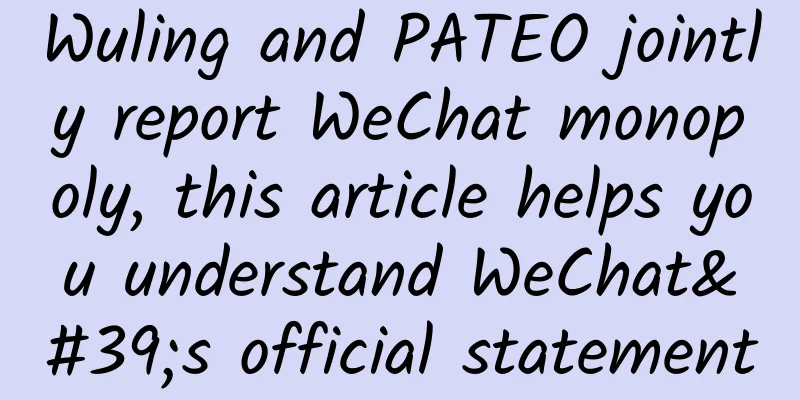Wuling and PATEO jointly report WeChat monopoly, this article helps you understand WeChat's official statement

|
Once the anti-monopoly floodgates were opened, the anger that had been suppressed for so long burst out. After Alibaba, China Literature Group, and Fengchao Network were fined for suspected monopoly, and just two days after Tencent was sued by Douyin for monopoly, the news that Baidu Internet of Vehicles and SAIC-GM-Wuling jointly reported Tencent's monopoly to the State Administration for Market Regulation once again made headlines on various websites. The complaint stated that Tencent abused its dominant position in the instant messaging market in mainland China by exerting pressure on automobile manufacturers, directly limiting Baidu's Internet of Vehicles products with WeChat functions from trading with automobile manufacturers without reasonable grounds. This has resulted in the exclusion and restriction of competition in the Internet of Vehicles products and services market, and constituted an abuse of market dominance prohibited by the Anti-Monopoly Law, which should be prohibited. Judging from the results, the two sides had already communicated numerous times before the formal confrontation. Botai & Wuling vs Tencent Tianyancha shows that Tencent Technology (Shenzhen) Co., Ltd. took SAIC-GM-Wuling Automobile Co., Ltd. and Shanghai Botai Yuezhen Electronic Equipment Manufacturing Co., Ltd. to court as early as October last year for unfair competition. The specific reason announced by Tencent is that Baidu Car Network developed the "New Baojun Car Connect" App and "WeChat Notification Assistant" software without Tencent's authorization and permission, which is suspected of constituting trademark infringement and unfair competition. As a follow-up to this case, there is the news that PATEO and SAIC-GM-Wuling jointly reported Tencent’s monopoly. The report stated that “Tencent abused its dominant position in the instant messaging market in mainland China, exerted pressure on automobile manufacturers, and directly restricted PATEO’s Internet of Vehicles products with WeChat functions from trading with automobile manufacturers without reasonable reasons, which resulted in the exclusion and restriction of competition in the Internet of Vehicles products and services market, constituting an abuse of market dominance prohibited by the Anti-Monopoly Law.” Baidu Internet of Vehicles believes that Tencent has extended its "ban order" to the automotive and Internet industries. As the undisputed king of domestic social software, WeChat uses its dominant position in traffic entrances to overtly and covertly "ban" software that is not in its camp. This is not news, but is written in black and white in the form of terms and conditions. Tencent responded quickly on its official account "Geely Blackboard", saying that the report by Baidu Yuezhen Electronic Equipment Manufacturing Co., Ltd. was using "malicious hype of monopoly" as a shield for infringement, and listed three major problems in Baidu's Internet of Vehicles calling and controlling WeChat software in driving scenarios without official authorization from Tencent. Tencent’s full statement is as follows: Judging from the statements of both parties, it seems that the incident is about to fall into a "Rashomon" state with each party sticking to its own story. So is it that Botai infringed the rights, or is it that Tencent monopolized the rights? Before more evidence emerges, we tend to believe that Baidu Internet of Vehicles did use the "微信" trademarks for promotion without authorization; Tencent did take advantage of WeChat's market dominance to restrict or even prohibit the development of competitors through exclusive means, and is suspected of monopoly. We might as well analyze the questions raised by Tencent one by one through the "Explanation" released by Tencent itself. Tencent once again raises the privacy stick In the article, Tencent mentioned that "the software can collect, store and upload sensitive data such as WeChat contact information and chat information without the explicit authorization of Tencent and users, which seriously infringes on the privacy and personal information rights of WeChat users." It should be noted here that Tencent used the phrase "'may' collect, store and upload...". For such a high-profile public relations article, the wording is cautious and prudent. However, Tencent did not point out that Baidu Car Network "collected", "stored" or "uploaded" in it, but used "may", indicating that Tencent only believes that Baidu Car Network has the technical ability to collect, store and upload WeChat-related data. Without any evidence, simply because Baidu Car Network may objectively have the ability to obtain WeChat-related data, it is considered that it "seriously infringed the privacy and personal information rights of WeChat users." Its actions are somewhat like a long-arm jurisdiction. Similar disputes have occurred in the past, between Tencent and Huawei. In 2017, Tencent complained to regulatory authorities about Huawei, claiming that the company collected user information, including WeChat chat information, through its Honor phones. To put it simply, the new Magic Live intelligent system of the Honor Magic phone EMUI will perform intelligent content analysis locally, automatically load address, weather, time and other information, and establish corresponding reminders if the user agrees to access chat content. For example, when you type content related to Thai food in WeChat, the mobile phone system will automatically recommend nearby Thai restaurants. From a legal perspective, according to the Cybersecurity Law, Huawei Honor's practices comply with the principles of legality, legitimacy, and necessity, and do not constitute an infringement of privacy. However, according to the WeChat terms of use, the chat records and other data generated by users on WeChat belong to Tencent. Tencent therefore believes that Huawei has violated its privacy data and that the user agreement signed with users is invalid. During the "Tencent-ByteDance War", Tencent also brought up this clause, saying that the ownership of users' WeChat usernames and avatars belongs to Tencent and ByteDance is prohibited from using them. Although the case was ultimately not concluded, Tencent’s honeymoon period with Huawei ended. For a long time afterwards, the fingerprint recognition function of Huawei phones could not be used for WeChat payments, and Tencent’s games were not optimized for Huawei phones, causing Huawei phone users to often mock themselves by saying “Jazz doesn’t play games.” The above situation continued until 2018 when Huawei phones officially became the No. 1 in the industry. Tencent’s boycott could no longer affect Huawei’s sales. On the contrary, Huawei phone users became a huge group that Tencent could not ignore. For safety? This reason is embarrassing! In the second statement, Tencent pointed out that the WeChat function of Baidu's Internet of Vehicles will threaten driving safety. "For driving safety reasons, WeChat's in-car scene only allows drivers to use basic voice communication functions. The software uses technical means to control WeChat's operations and disguises itself as an Android auto application to trick WeChat into obtaining the WeChat message reply interface, thereby implementing various complex functions, posing a risk to users' driving safety." Using WeChat while driving may distract the driver and affect safety, and concerns about the safety of car owners seem to be correct. Moreover, the method used by Botai is to "pretend to be an Android Auto application" and "trick WeChat into obtaining the reply interface of WeChat messages". This is a deception and a sneak attack! But is this really the case? Can't use WeChat while driving? In fact, Tencent announced the start of the development of in-car WeChat as early as 2018, and Tencent has already installed it on some cooperative models of GAC, Great Wall, and Changan. Ideal ONE also supported in-car WeChat in last year's OTA. The function of in-car WeChat is not as Tencent said that "only basic voice communication is allowed". The driver can send and receive WeChat and make voice calls through voice interaction. According to the public information released by PATEO Car Connect, its WeChat function can also broadcast new information by voice and reply to messages by voice, which is essentially the same as Tencent Car WeChat. It is hard to say that Tencent Car WeChat is safer for drivers than PATEO Car Connect's WeChat function. Some industry insiders believe that Baidu's Internet of Vehicles system was banned by Tencent from being sold to OEMs mainly because it did not pay Tencent. As for the "Android Auto" disguised as Baidu's Internet of Vehicles mentioned by Tencent, this is Google's official in-vehicle operating system, similar to Apple's CarPlay and Huawei's HiCar and Baidu's CarLife. WeChat adapted it early on and made it available for free to all models adapted to Android Auto. For well-known reasons, Google services are not available in China, so Tencent's in-car WeChat has become a feature that is free for foreign users but has a high threshold for domestic car companies to use. Ultimately, there are only three outcomes for domestic users: 1. Pay to use WeChat in the car (the car company's fees will of course be passed on to consumers); 2. There is no in-car WeChat, so you need to use WeChat on your phone unsafely; 3. Adapted WeChat on its own and was sued by Tencent. As for which apps can be installed on the car computer and which apps involve driving safety issues, this should also be the responsibility of the road regulatory department. Car companies and software service providers only need to make regulations. However, as a commercial company, Tencent has taken on the work of a road regulatory department, using the eyes of a judge to check whether other people's applications endanger driving safety. No wonder it is considered to be "overreaching". In fact, not only WeChat is available in the car, but even Apple, which attaches great importance to privacy and security, has added communication software such as iMessage, Telegram and WhatsApp to the few software supported by CarPlay, which can broadcast and reply by voice. Apple is well aware that it is unrealistic to expect users not to use communication software while driving. It is better to try to adapt the car to improve safety, reduce the difficulty of operation for drivers, and reduce the intensity of distraction. Therefore, Tencent’s claim in its statement that Botai Internet of Vehicles violated the privacy of WeChat users and threatened their driving safety was more of a means for Tencent to “stigmatize its rivals.” In the past, Tencent banned apps such as Douyin and Xigua Video in WeChat, mostly citing "illegal access to WeChat user personal information" and "violation of platform rules" as reasons. However, Tencent-related apps have no such restrictions on the use of user relationship chains. For Tencent-related games that can only be logged in via WeChat or QQ, users' "friend list" permissions cannot be turned off. Infringement or monopoly, which is more serious? WeChat's influence in China far exceeds that of iMessage in the United States. According to a survey by Ford Motor Company, 59% of Chinese drivers use WeChat on their mobile phones while driving. Obviously, this poses a very serious hidden danger to driving safety. SAIC-GM-Wuling and PATEO used the "微信" trademarks for promotion without Tencent's authorization, which indeed constituted trademark infringement. However, the fact that Tencent uses WeChat's dominant position in the communications software field to restrict and exclude its competitors is also openly concealed. Tencent has used similar methods in the past. When the game "Honor of Kings" was very popular in 2017 and 2018, there were 200 million players in China. The performance of the game "Honor of Kings" even affects the strategy of users when choosing mobile phones. The announcement of Tencent's "optimization" at the press conference can boost the sales of new phones, which also led to the legend of Tencent's "charged optimization" and "negative optimization without payment". It is difficult to verify the authenticity of the legend, but the actual situation is that OPPO and vivo phones using mid- and low-end SoCs, with the support of multi-threaded optimization, run "Honor of Kings" more smoothly than Samsung phones equipped with flagship SoCs but only single-threaded, indirectly creating the high profit myth of the blue and green factories in those two years. If the optimization of mobile phone games was the icing on the cake, then cutting off the in-car WeChat port is a punishment that cuts off the firewood. As cars become more intelligent and internet-based, the room for Internet giants like Tencent to maneuver is beyond the imagination of many people. Do we need to keep recharging our cars in the future? As a winner of Toutiao's Qingyun Plan and Baijiahao's Bai+ Plan, the 2019 Baidu Digital Author of the Year, the Baijiahao's Most Popular Author in the Technology Field, the 2019 Sogou Technology and Culture Author, and the 2021 Baijiahao Quarterly Influential Creator, he has won many awards, including the 2013 Sohu Best Industry Media Person, the 2015 China New Media Entrepreneurship Competition Beijing Third Place, the 2015 Guangmang Experience Award, the 2015 China New Media Entrepreneurship Competition Finals Third Place, and the 2018 Baidu Dynamic Annual Powerful Celebrity. |
>>: China Automobile Dealers Association: December 2022 automobile retail sales ranking report
Recommend
Analysis of Ele.me’s membership system!
As part of a series of membership analysis articl...
China's "compound eyes": tracking "uninvited guests" in space
If an asteroid hits the Earth one day, is it poss...
When you were visiting scenic spots, did you eat the themed popsicles?
From tapes, bookmarks, refrigerator magnets to do...
What does it mean to be data sensitive? How does APP do data analysis?
Today I will talk about my understanding of data....
Douyin Promotion and Operation丨How to write a Douyin title that gets over 10,000 likes?
When it comes to new media, the first thing that ...
Starting from August 1st, the country will uniformly replace the disabled military personnel certificates! How to apply? What benefits can I enjoy?
When the August 1st Army Day comes every year, th...
NetEase Cloud Music's marketing campaigns in the first half of 2017
NetEase Cloud Music is a music product that focus...
Samsung S5 screen test
Bulgarian website Smartphone.bg praised the Galaxy...
Tech World presents a hodgepodge of black technologies, which one is Lenovo's main dish?
When the CEOs of Intel and Microsoft, first-line ...
Vipshop’s live streaming IPization, what is the potential of “original video + shopping guide live streaming”!
The Olympic Games have just ended. In this Olympi...
What do the Tik Tok short video tags mean? How to quickly tag on Tik Tok?
With the explosive popularity of short videos on ...
Apple's App Store search rules have become dramatically more equal
Last week, the news that Apple CEO Tim Cook came ...
Create a public account with a monthly income of 20,000 yuan. Newbies can quickly start from scratch and detonate fan traffic
At present, official accounts are still the best ...
Product operation and promotion | 5 underlying ideas for traffic growth!
Today I would like to share with you five importa...









